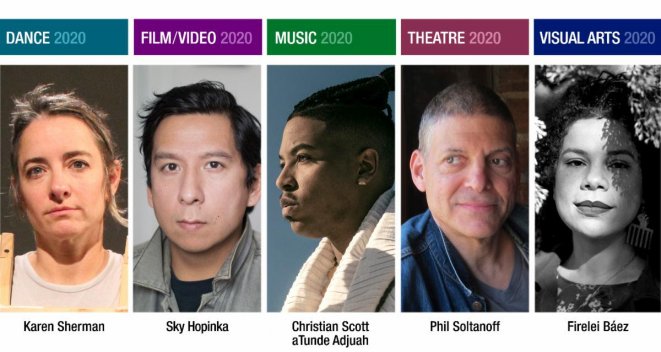By Jackie Moe for Backstage SoCal -May 21, 2020
The COVID-19 pandemic has left artists all around the world with canceled tours, closed galleries, and empty theaters. But Herb Alpert, Grammy Award-winning music legend and visual artist icon, feels that what the world needs now is art — and he is doing his part to support and spread that message.
Despite the lockdown, the Herb Alpert Foundation and CalArts will host the 26th annual Herb Alpert Award in the Arts — virtually, of course — which provides five unrestricted $75,000 grants to independent artists working in dance, film/video, music, theatre and visual art. This year’s online awards presentation will be held on Friday, May 22 at 2 p.m.
Over the course of 26 years, the Awards have granted $8 million to working artists, making Alpert and wife Lani Hall one of the most influential and fiercest supporters of arts and arts education. I had the honor to chat with the always insightful and wonderfully engaging Alpert about why this award is more important than ever, his current projects, and what art means to him.
Well, I still have it on hand here. This is what I do. I play the trumpet, I record, I paint and I sculpt and that’s me all the time.
Well, I’ve been recording. I have a recording facility in my studio here and so I’ve been recording. And I’ve painted more pictures that I know what to do with, and I’ve also been sculpting. I’m a right-brained guy. And this is why I love the arts so much. I think the soul of our country is shaped by our artists. And not just musicians, but actors and poets and dancers and everybody. We need them. Especially at this time. We need the arts. I mean, the artists are our second responders. They’re the people that keep us buoyant and keep us feeling, and that is so crucially important. That’s why Herb Alpert Awards are a part of it, but just a small part of it. We’ve got to get everybody to get on board, especially the politicians where they feel like the arts are dispensable.
Yeah. Unfortunately they should be next in line. I mean, we need the first responders. They’re the ones that keep us alive. But the second responders are the ones that give us hope. That’s what we need. That’s why we need the artists, I believe. It’s a different time. Hopefully there’s an end. I don’t know if there’s an end in sight, but there’s an end someplace.
I always look to honor the artists that go for the road less traveled, you know, the ones that are pushing it a little differently in a more experimental way. I think those are the real artists. Those are the ones that they don’t care whether you like it or not. They’re going to be doing their thing, and they are not doing it for the money. They’re doing it for their soul, for their art form. I mean that’s their passion. So I tend to gravitate towards those people. And you know my story; I had this opportunity when I was eight years old and I’ve been blessed way beyond my dreams, and it gives me pleasure to be able to help pass it on.
Oh, well that’s a good question. It’s different for every artist, but everyone has their own idea of what art is and who’s great and who’s not. It’s very personal. But we try to bring together great people to make those decisions. I’m not involved in the decisions at all. Intentionally. But we have really qualified people that help guide us and I believe in their choices.
Well, not really actually. I mean, overall I have, but this is our 26th year. So there’s a lot of artists out there; some have done really well, some are still looking for their spot in the sun. But it’s all worth it, because I think art plays such an important part in our society. I’m just one of many that feel the same. And unfortunately our politicians seem like they don’t get it for the most part. I’m not saying all of them, but a lot of them just don’t think that the arts are worth investing in. And some of the larger corporations are also kind of dialing down with the arts at this moment. Unfortunately it seems like they have other priorities. But I see priority number two for me is making sure we keep art alive. I’m not only talking about jazz and music; I’m talking about painting and sculpting and acting and dancing and singing and everything that has to do with the arts.
Well, it’s definitely hindered our artists. I mean there’s so many artists that were relying on doing live concerts and working with other bands and earning a living that way. And now they’re in a bit of a struggle. A lot of artists are not as active as they would like to be sadly.
Well, that’s a really good question. You’re talking about the unknown. I don’t know how long this is going to last. We need some different leadership that would help people to respond to how great and how important it is to have the arts in our lives. I know what we’re trying to do is keep our communities alive, and we try to get into communities that are often overlooked and underserved. So the crisis has really shown a light on the inequities that have plagued our society for decades. So it’s a problem. I hope maybe there’ll be some different understanding when we get out of this of what we need to do; there’s some new things to think about. It’s really interesting. The times they are a-changin’. Bob Dylan said that. They really are changing. They’re changing dramatically. And unless we get on board, we’re going to be in trouble.
Oh yeah, fear is part of an artist’s repertoire. That’s what you do. That’s what art is all about. That’s what good art is all about. You know, you’re always wondering whether you can rise to the occasion, whether you’re playing jazz or standing in front of a blank canvas or creating something with clay. The fear is, do I know what I’m doing? Can I come up with something worth looking at? And I think fear is part of the repertoire of an artist. Cause there’s the unknown. That’s the thing that is so inspiring about art. It’s seductive because the arts are a mystery; you can’t put your finger on it. You can’t put your finger on what you like about it, or what you don’t like about it.
When you think of all the great songs and things that have been written through the years in the Western lexicon, there’s 12 notes. Everyone has those same 12 notes. Mozart had those notes. Beethoven had those notes. Thelonious Monk had those notes. Charlie Parker had those notes. You know what I’m saying? It’s a great mystery of how do you get all these different combinations out of 12 notes? You can’t figure it out, even if you try to analyze it. And there are people that have tried to analyze it, but you can’t, because it’s in that other special place that has to do with feelings. And that’s why art is so important.


